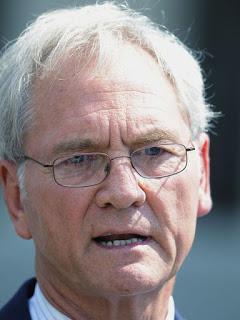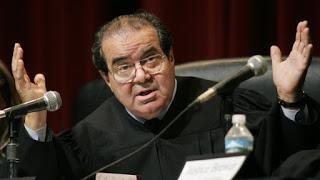
Don Siegelman
(From Montgomery Advertiser)
Here is the central issue in the Siegelman appeal: May a court consider acquitted conduct to increase a sentence within the statutory range of the offense for which the defendant was convicted? That is precisely what U.S. District Judge Mark Fuller--who since has resigned from the bench in the wake of a wife-beating scandal--did in the Siegelman case. And it's a big reason Siegelman is not scheduled for release from federal prison until August 8, 2017.
To a considerable extent, he is being held now based on charges of which a jury acquitted him. A number of constitutional and legal groups have filed briefs in the case, arguing that such an outcome violates a defendant's Sixth Amendment right to a jury trial and violates the Right to Popular Sovereignty inherent in the U.S. Constitution.
Based on news reports about a similar 2014 case, two of the Supreme Court's most conservative justices--Antonin Scalia and Clarence Thomas--appeared ready to side with Siegelman, a Democrat. Liberal justice Ruth Bader Ginsburg, who joined Scalia and Thomas in a 2014 dissent, also appeared ready to side with Siegelman.
If Scalia, Thomas, and Ginsburg voted to hear the Siegelman case--as seems likely--that means no other justice provided a fourth vote needed to hear the case. SCOTUS announced that Obama appointee Elena Kagan did not participate in deliberations because, as solicitor general, she had written a brief urging the high court to uphold the Siegelman convictions.
If this scenario played out behind the scenes, that means two liberal justices--Clinton appointee Stephen Breyer and Obama appointee Sonia Sotomayor--could have provided the fourth vote needed to hear the Siegelman case. But they apparently did not do it.
That raises this question: If Democrats are the party that champions constitutional rights, what kind of rights are Breyer and Sotomayor supporting--especially on an issue where even Antonin Scalia and Clarence Thomas see constitutional problems?
Here's another question--Hillary Clinton has powerful ties to both the Bill Clinton and Barack Obama administrations. What does this outcome say about her priorities regarding civil rights? Should she be pressed about this issue on the campaign trail? Could this cause Democrats who truly care about constitutional protections to support Bernie Sanders?
The 2014 case was styled Jones v. United States. Here's how the Stanford Daily summarized the facts and legal issues surrounding the case:
The case arose in Washington, D.C. Three men, Joseph Jones, Desmond Thurston and Antwuan Ball, were charged with, among other things, running an “open-air” drug market — essentially a conspiracy to distribute large amounts of drugs. If convicted on that charge, the men would effectively be held liable for all of the drugs dealt by the entire “organization,” much more than any of the men had personally distributed. The jury, however, did not convict on the conspiracy charge, and instead merely found the men guilty of distributing the relatively small amount of drugs that each had personally dealt— between two and 11 grams of crack cocaine. . . .
Nevertheless, the judge accepted the government’s argument and sentenced the defendants as if they had conspired to distribute more than 500 grams of crack, even though they had been specifically acquitted of those charges. The defendants therefore received sentences varying from 15 years to almost 19 years, sentences nearly four times the length of the next highest sentences imposed for similar convictions.
How did that sit with Scalia, Thomas, and Ginsburg? Not well, as the Stanford Daily reports:
The Court, however, denied certiorari, but not without dissent. Justice Scalia published a vigorous dissent, insisting that it was time for the Court to put an end to this practice. First marshaling precedent, Justice Scalia explained that any fact that increases the penalty to which a defendant is exposed is essentially an element of a crime, and therefore must be proved to a jury, not a judge. The Court has also held that a substantively unreasonable sentence is unconstitutional and must be set aside. It follows, then, according to Justice Scalia, that “any fact necessary to prevent a sentence from being substantively unreasonable — thereby exposing the defendant to the longer sentence — is an element that must be either admitted by the defendant or found by the jury.” Because the defendants argued that their sentences were only reasonable if the conspiracy was considered relevant conduct that could increase the Guideline penalty, the Sixth Amendment was implicated. Justice Scalia then closed by insisting that the Court should have taken this opportunity to “put an end to the unbroken string of cases disregarding the Sixth Amendment.”
Justice Scalia was not alone in his dissent. In fact, criminal cases can often lead to unusual lineups of Justices, and this case was one such example. Joining Justice Scalia in his dissent from denial of certiorari were Justices Thomas and Ginsburg. Given just one more vote, then, the Court would have granted certiorari to resolve this important issue.
Dissents from denial of certiorari are rare, and no such dissents were forthcoming in the Siegelman case. But three justices, from a wide range of political perspectives, have already made it clear where they stand on the issue.

Antonin Scalia
(From Mother Jones)
"It is hard to believe we live in a country where justice is just a game.” Bob Dylan
"U.S. Citizens do not have a constitutional right not to be framed": The U.S. Solicitor General, January 4th, 2010, in an argument to the U.S. Supreme Court defending Iowa law enforcement in a civil suit by two men who spent 25 years in prison for a crime they didn't commit. They were intentionally framed.
Today, the U.S. Supreme Court gives its stamp of approval to the practice of allowing judges to add years to a defendant's sentence for matters a jury found the defendant innocent!
We criticize North Korea, China and other countries for human rights violations while turning a blind eye to our own.
Today's U.S. Supreme Court decision is so extraordinarily shocking and is an example of America's democratic hypocrisies.
116 former state Attorneys General and The Constitution Project argued that a jury decision is final, that the U.S. Constitution gives the people, speaking through a jury, the final decision on guilt or innocence. The U.S. Supreme Court has thumbed its nose at justice."
Don E. Siegelman
Governor of Alabama, 1999-2003
